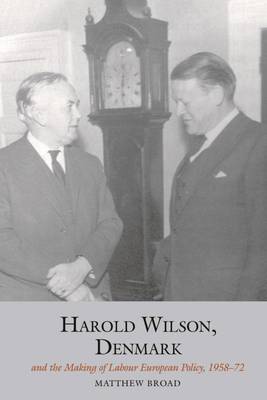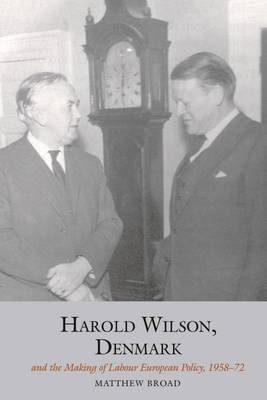
Je cadeautjes zeker op tijd in huis hebben voor de feestdagen? Kom langs in onze winkels en vind het perfecte geschenk!
- Afhalen na 1 uur in een winkel met voorraad
- Gratis thuislevering in België vanaf € 30
- Ruim aanbod met 7 miljoen producten
Je cadeautjes zeker op tijd in huis hebben voor de feestdagen? Kom langs in onze winkels en vind het perfecte geschenk!
- Afhalen na 1 uur in een winkel met voorraad
- Gratis thuislevering in België vanaf € 30
- Ruim aanbod met 7 miljoen producten
Zoeken
Harold Wilson, Denmark and the Making of Labour European Policy
Matthew Broad
€ 97,95
+ 195 punten
Uitvoering
Omschrijving
'In 1958, Britain and Denmark both advocated closer European cooperation through the looser framework of the Free Trade Area (FTA) rather than membership of the nascent European Economic Community (EEC). By 1972, however, the situation had changed drastically. The FTA was a long-forgotten concept. Its replacement, the European Free Trade Association (EFTA), seemed economically and politically inept. Now, at the third time of asking, both countries were on the verge of joining the EEC as full members. This compelling analysis compares how the European policies of the British Labour Party and the Danish Social Democrats evolved amid this environment. Based on material from 12 archives in four countries, it updates our knowledge of key moments in both parties' interaction with the integration story, including in the formative stages of the EEC in 1958¬-60 and the negotiations for British and Danish EEC membership in 1961-63, 1967 and 1970-72. More innovatively, this book argues that amid an array of national and international constraints the reciprocal influence exerted by Labour and the SD on each other via informal party contacts was itself a crucial determinant in European policymaking. In so doing, it sheds light on the sources of Labour European thinking, the role of small states like Denmark in the integration process, and the prominence of the Anglo-Scandinavian nexus in the broader narrative of British foreign policy in this period.'
Specificaties
Betrokkenen
- Auteur(s):
- Uitgeverij:
Inhoud
- Aantal bladzijden:
- 304
- Taal:
- Engels
- Reeks:
- Reeksnummer:
- nr. 10
Eigenschappen
- Productcode (EAN):
- 9781800857131
- Verschijningsdatum:
- 1/08/2021
- Uitvoering:
- Paperback
- Formaat:
- Trade paperback (VS)
- Afmetingen:
- 156 mm x 234 mm
- Gewicht:
- 426 g

Alleen bij Standaard Boekhandel
+ 195 punten op je klantenkaart van Standaard Boekhandel
Beoordelingen
We publiceren alleen reviews die voldoen aan de voorwaarden voor reviews. Bekijk onze voorwaarden voor reviews.









